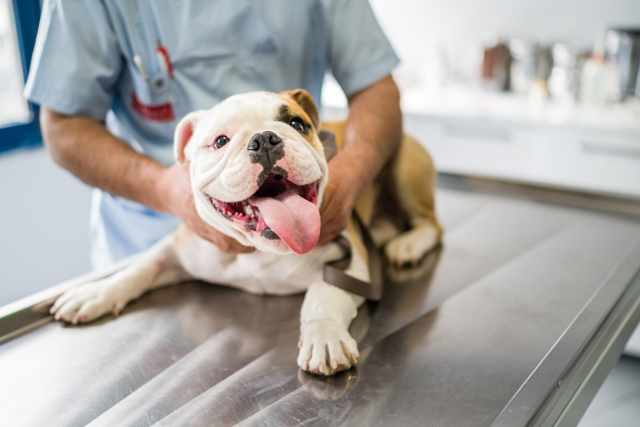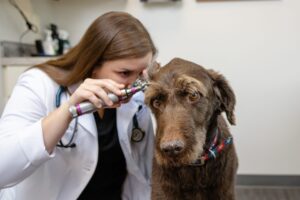If you want to live a long, happy, and fulfilling life with your pet, it is important to understand your pet’s health. Pets can develop many different health problems, some of which are more common than others. This guide discusses seven of the most common health problems in pets, showing how to recognize them and how to successfully treat or avoid them.
1. Skin Disorders in Pets
Skin problems are one of the most common health problems in dogs. These problems can have a variety of causes, including allergies, infections, and pests such as fugitives and mites. Often itching, redness, hair loss and sometimes secondary diseases are signs. Treatment for these conditions depends on the cause and includes medications, topical treatments, or dietary changes. Prevention is important and you can do this by cleaning your pet regularly and keeping the wool under control.
2. Dental Problems
Dental health is an important part of your pet’s overall health, but it is often overlooked. Plaque buildup and gum disease are just some of the dental problems your pet can develop. Bad breath, difficulty eating and drinking, and red or swollen gums are warning signs. To prevent these problems, it is important to have your teeth checked regularly, care for your teeth by brushing and flossing, and have your teeth professionally cleaned. Providing your children with chew toys and dental treats can also help keep their teeth healthy.
3. Pets that are overweight
Pets that gain weight can lead to major health problems such as diabetes, heart disease, and joint pain. Overnutrition and lack of exercise are often the culprits. A balanced diet, appropriate amounts of food and daily exercise are all important in keeping your pet’s weight under control. A tailor-made exercise and nutrition plan can also be developed with the help of regular visits to the vet.
4. Parasitic infection
Pets can develop parasitic diseases. Fleas, ticks, and intestinal worms are the most common. These parasites can cause you to experience many different sensations, from itching and pain to more serious health problems. It is important to take preventive measures, such as the daily use of antiparasitic medications. If you become ill, certain medications and treatments are necessary to eliminate the parasites and relieve symptoms.
5. Allergies in Pets
Pet allergies can be caused by several causes, such as food, environment, and exposure to allergens on the skin. Symptoms vary widely but often include itchy skin, stomach problems, and breathing problems. To control allergies, you need to find the allergen. This may mean changing your pet’s diet, changing its environment, or giving it medication. In some cases, allergy testing and medications may be recommended.
6. Intestinal problems
Poor eating habits, infections, or long-term conditions like inflammatory bowel disease can all result in mild to severe digestive issues in pets. Symptoms often include vomiting, diarrhea, loss of appetite, and abdominal pain. Rapid diagnosis and treatment are important. Treatment may include changing the patient’s diet, giving medications, or even more invasive procedures such as surgery.
7. Urinary tract infection
Pets, especially females, often suffer from urinary tract infections, which can manifest as frequent trips to the toilet, discomfort during travel, and blood in the urine. Detecting the disease early and treating it with antibiotics is important to eliminate the disease and prevent it from worsening. One way to prevent this is to make sure your pet has clean water and regular access to the bathroom.
Conclusion
In general, cat health includes many aspects, such as skin problems and urinary tract infections. To ensure your pet stays healthy, you need to understand and address these common health problems. Regular vet visits, preventative care, and treatment if necessary are important to keep your pet healthy. By understanding the signs and symptoms of these diseases, pet owners can provide the best care for their furry friends and ensure they live happy and healthy lives.
FAQs
1. How do pets become overweight?
Pets gain weight because they eat too much and don’t exercise enough. When pets eat more calories than they burn, they gain weight. This is because they store excess energy as fat. Obesity can be caused by eating large amounts of high-calorie foods, snacks, or table scraps, by insufficient exercise, or by a genetic predisposition. Certain types and ages of pets are more likely to be overweight, such as older pets that don’t play often. To keep your pet in good health, monitor his weight and adjust his eating and exercise habits as necessary.
2. What are the health risks of overweight pets?
Overweight pets are more likely to develop diabetes, joint problems, heart disease, and respiratory problems, and are more likely to die. Carrying extra weight puts a strain on the joints, causing stiffness and movement problems. Being overweight also increases the risk of developing diabetes due to insulin resistance. Overweight pets are more likely to develop heart diseases, such as high blood pressure and heart problems. Controlling fat is important to reduce these health risks and make people healthier overall.
3. What is the safest way to help my pet lose weight?
For pets to lose weight safely, they need to change their eating habits and increase physical activity. Talk to your vet about what weight is best for your pet and develop a plan to help him lose weight. As part of this plan, you can switch to a low-calorie diet, monitor your intake, eat fewer snacks, increase your exercise by walking or playing outside, and check your progress regularly. To maintain good health, you need to lose weight slowly.
4. What are the most common symptoms of toothache in pets?
Pets with dental problems may suffer from bad taste, plaque buildup, swollen or bleeding gums, loose or missing teeth, reluctance to eat, constant clawing, and excessive drooling. These signs could mean that you have problems such as gum disease, tooth decay, or an oral infection. Regular dental checkups and at-home oral care, such as brushing and chewing your pet’s teeth, can help keep teeth healthy and prevent dental problems.
5. Why is it important for pets to have healthy teeth?
Dental health is important to your pet’s overall health, as oral problems can lead to pain, discomfort, and health problems throughout the body. If oral problems are left untreated, bacteria from the mouth can spread to organs such as the heart, liver, and kidneys. Good dental care keeps teeth and gums healthy, prevents dental disease, promotes digestion, and improves your pet’s overall life.
6. Why is it important for pets to have regular veterinary checks?
Pets need regular check-ups with the vet so that health problems can be detected early and avoided. During an examination, your veterinarian will check your pet’s overall health, give him vaccinations, check for diseases, brush his teeth to prevent parasites, and provide nutritional advice. If you spot problems early, you can tackle them before they get worse and ensure your pet’s healthy life.



